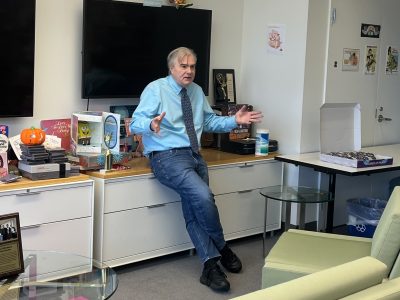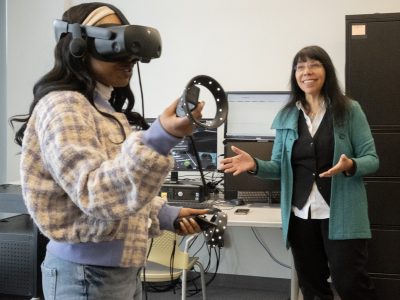Cramer Family Foundation Professor of Practice in Community Impact Named
The Maxwell School of Citizenship and Public Affairs‘ recently appointed Cramer Family Foundation Professor of Practice in Community Impact brings a rare combination of community-based civic engagement and expertise in cultivating changemakers across a range of fields.
Liz Arnold joined the Maxwell School in August as part of the newly formed Civic and Community Engagement office. She is teaching undergraduates from a range of University degree programs with a focus on experiential learning, leadership development and problem-solving.
This semester, Arnold is teaching a capstone course in which students are tasked with turning their social science research into an action plan in partnership with a local government or community organization. One project focuses on using social media strategies to help nonprofits expand engagement and impact. Another aims to help families facing hardship to keep their pets while relieving pressure on local shelters.
Arnold plans to develop additional courses focusing on public narrative and civic leadership as well as applied social innovation and partnership building.
“These classes provide students with the analytical tools and practical skills needed to identify social problems, develop evidence-based responses and lead effective community engagement efforts through hands-on research and real-world partnerships,” she says. “By connecting rigorous analysis with practical implementation, students develop the civic leadership skills essential for creating lasting change and strengthening democratic institutions.”
The Cramer Family Professor of Practice in Community Impact was established through a generous gift by the Gerald and Daphna Cramer Foundation to provide support to students across a range of community engagement efforts that develop capabilities and skills in entrepreneurship, civic engagement, philanthropy, systems change, social innovation and impact.
The late Gerald B. Cramer earned a degree in accounting from the Martin J. Whitman School of Management in 1952 and went on to become one of the Maxwell School’s most generous and dedicated supporters. He and his wife, Daphna, funded professorships and graduate assistantships and supported the creation of the Global Affairs Institute at Maxwell (now the Daniel Patrick Moynihan Institute of Global Affairs) as well as the University’s Institute for National Security and Counterterrorism (now the Institute for Security Policy and Law).
Arnold says her work across fields and sectors has given her a unique lens and ability to connect with and mentor students with wide-ranging interests.
Most recently, she served as director of leadership engagement and impact at the Truman National Security Project, where she developed training programs and oversaw national policy and impact networks. At Google, she led national Ph.D. outreach strategies and helped launch diversity initiatives that continue to shape the company’s talent pipeline.
Her approach at Maxwell also draws on two decades of experience at top academic institutions. At Cornell University’s Johnson Graduate School of Management, she redesigned the technology career curriculum, advised MBA students and grew the school’s High Tech Club into its largest professional organization.
At MIT’s School of Engineering, she managed the Undergraduate Practice Opportunities Program, helping engineering students integrate professional skills with technical expertise. And, at the Harvard Kennedy School’s Center for Public Leadership, she coordinated interdisciplinary fellowship programs that immersed graduate students in dialogue with influential leaders.
Across roles, Arnold says she has focused on three core principles: applied learning that connects classroom theory with real-world practice, cross-sector relationship-building and leadership development that empowers diverse voices. “Whether I was working with engineering students at Google, MBA candidates at Cornell or community members, the approach has been the same—give people the tools, connections and confidence to create change,” she says.



